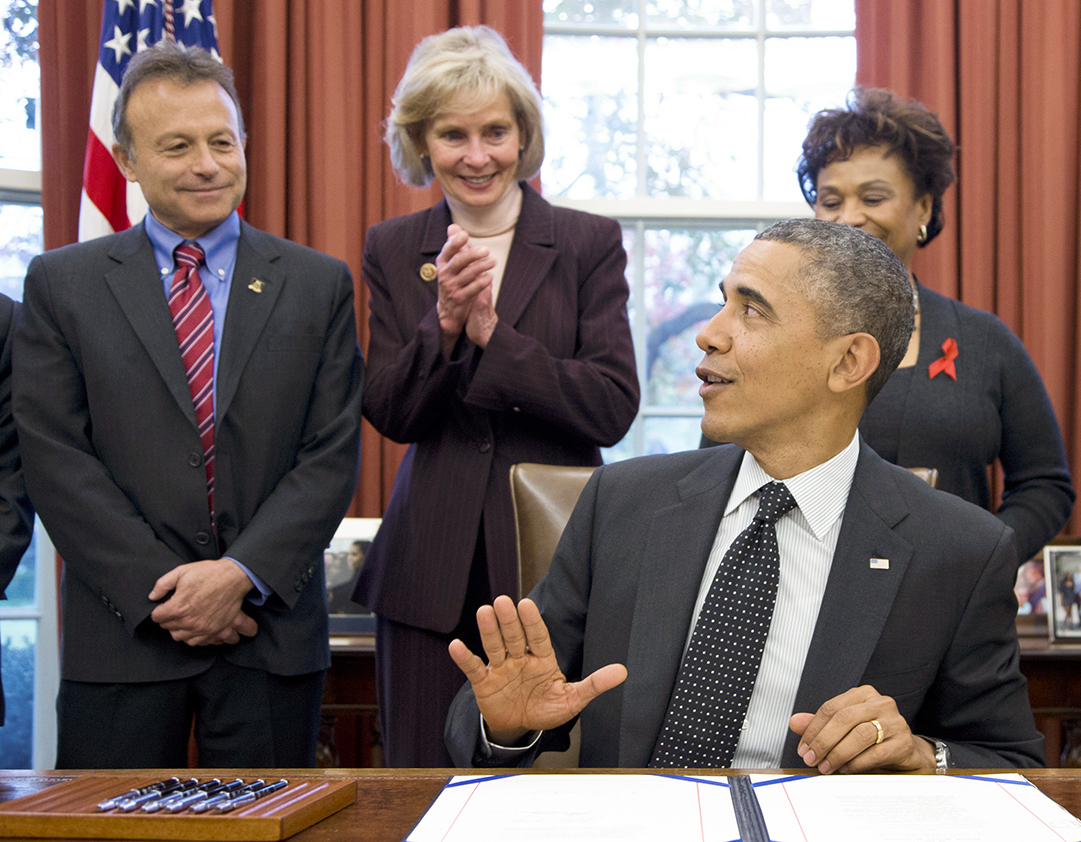Moving Mountains - A Surgeon’s Fight to Legalize HIV-to-HIV Organ Transplants

President Barack Obama signs the HOPE Act legislation in November 2013. Peter Stock (far left) had earlier testified before Congress in support of the legislation, which overturned a federal ban on HIV-to-HIV transplants. Photo by Evan Vucci
UCSF News reports on the epic battle, led by UCSF transplant surgeon Peter G. Stock, M.D., Ph.D., to repeal long-standing federal and state laws banning HIV-to-HIV organ transplantation, this after having served as lead Principal Investigator on a landmark clinical trial demonstrating the feasibility and clinical benefit of such transplants, and, in the process, turning conventional medical wisdom on its head. Dr. Stock's indefatigable efforts and skilled advocacy were instrumental in forging the rare bipartisan consensus that culminated in the passage of the HIV Organ Policy Equity (HOPE) Act, opening the door for potentially tens of thousands of additional patients to receive a life-saving organ transplant.
Peter Stock, MD, PhD, a transplant surgeon at UC San Francisco, considers himself a representative specimen of his profession. “I think we’re all typically atypical,” he said, by which he means that transplant surgeons thrive on intensity, whether in the operating room or in pursuit of outside interests.
At age 60, he still does about 75 transplants a year, including kidneys, livers and pancreases, runs the Boston Marathon every spring, and skis the American Birkebeiner, a cross-country ski marathon in Wisconsin, every winter. When he can take time off, he climbs mountains around the world.
“I think my interest in endurance events is probably a little bit unique,” he said, on second thought.
Peter Stock’s mountaineering expeditions have brought him to some of the highest peaks in the world, including Huascarán, the highest mountain in the Peruvian Andes. Photo courtesy of Peter Stock
Stock has always been driven to crack whatever problem is set before him – whether that’s an 8,000-meter mountain peak, a cellular or pancreas transplant to cure diabetes, or outdated laws denying organ transplants to people with HIV.
His tenacity in overcoming hurdles in front of him has led him to ascend some of the tallest mountain peaks in the world and to clear the way for surgeons at UCSF to perform California’s first organ transplants from an HIV-positive donor to HIV-positive recipients.
Just two years ago, such HIV-to-HIV organ transplantations were illegal under federal and state laws written at the height of the AIDS scare in the 1980s. Those bans were repealed thanks in part to groundbreaking research by Stock that showed that transplants in HIV patients could be done safely and effectively.
Just two years ago, such HIV-to-HIV organ transplantations were illegal under federal and state laws written at the height of the AIDS scare in the 1980s. Those bans were repealed thanks in part to groundbreaking research by Stock that showed that transplants in HIV patients could be done safely and effectively.
As a result, Reynaldo Garza, a 59-year-old former florist who had been living with HIV for 20 years and a pair of failing kidneys for seven, recently became one of the first people in California to consent to receiving an HIV infected organ. In November 2016, he gladly accepted a kidney from a deceased donor who tested positive for HIV.
“It was an easy decision for me,” said Garza. He had been very sick for a long time. He was tired of going in for dialysis three times a week, for four hours at a time, sometimes at five in the morning if that was the only slot open. “I already had HIV, I had hepatitis C, I had renal failure. I was like, ‘Yes, I’ll sign anything. Just give me an organ.’”
